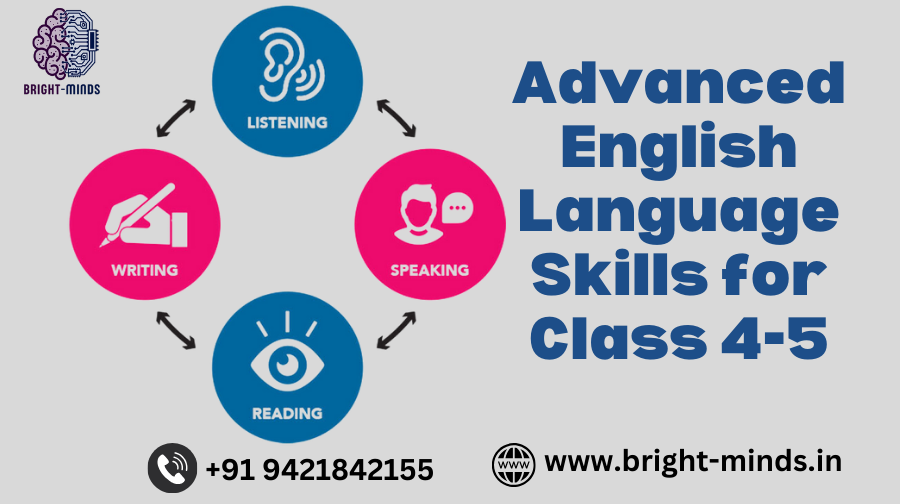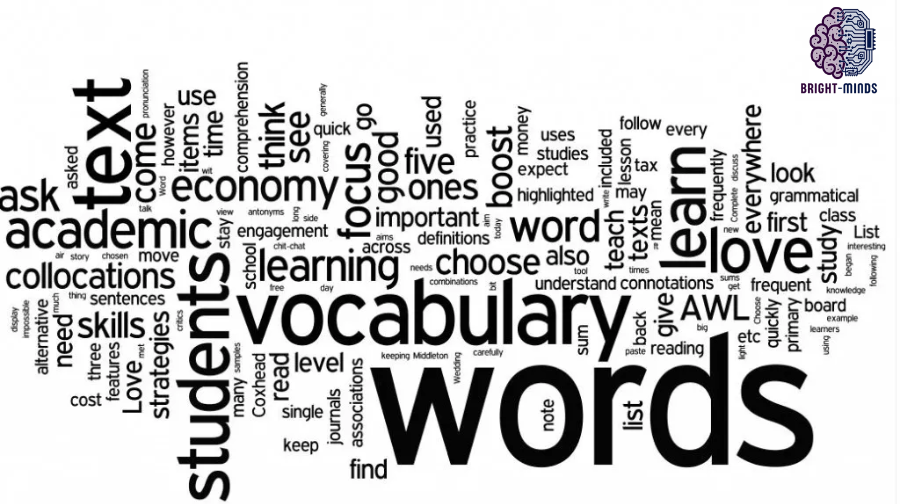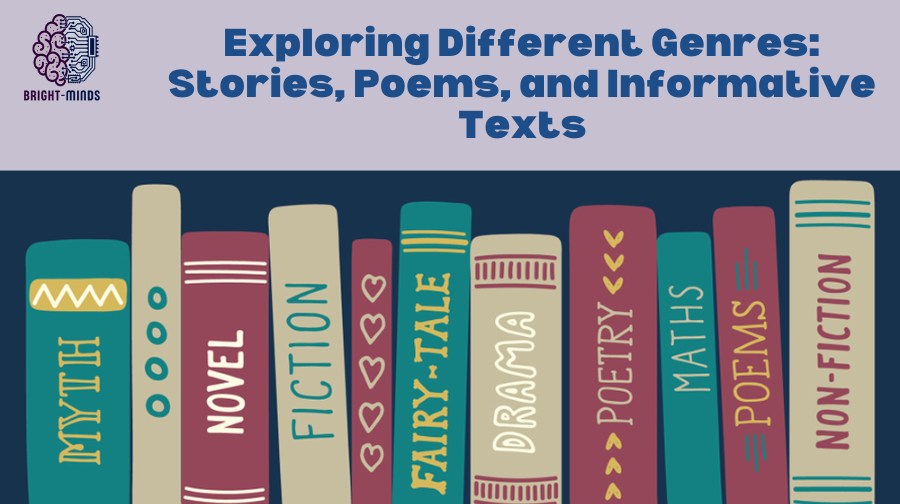
Develop advanced English language skills in Class 4-5 with a focus on vocabulary, grammar, reading, writing, & communication build a strong academic foundation
As students progress through their early years of education, the focus on language skills becomes increasingly sophisticated. In English Language Skills classes 4-5, children are not just learning to read and write; they are beginning to explore more complex aspects of the English language. This period is crucial for laying a solid foundation in advanced English language skills that will serve them throughout their academic journey and beyond. The key areas of focus at this stage include expanding vocabulary and sentence structure, introduction to paragraph writing and comprehension, and exploring different genres such as stories, poems, and informative texts.
Strengthening Listening and Speaking Skills: The Art of Communication
Effective communication involves both listening and speaking skills. At this stage, students should be encouraged to engage in activities that promote active listening, clear articulation, and confident public speaking.
- Listening Comprehension: Listening exercises should go beyond simply hearing the words. Students should be taught to listen for main ideas, supporting details, and speaker intent. Activities such as listening to audio stories, podcasts, or news reports, followed by discussions or quizzes, can help strengthen listening comprehension.
- Public Speaking: Public speaking exercises, such as presentations, debates, or storytelling, help students develop confidence and clarity in their spoken communication. These activities also provide opportunities for students to practice organizing their thoughts and delivering them in a coherent and persuasive manner.
- Group Discussions: Group discussions or Socratic seminars are excellent ways to encourage students to articulate their thoughts while also practicing active listening. These discussions can be based on reading assignments, current events, or open-ended questions, and they help students learn to express their ideas while respecting differing viewpoints.
- Pronunciation and Intonation: Pronunciation and intonation are important aspects of effective communication. Teachers can incorporate pronunciation exercises, reading aloud, and speech practice into their lessons to help students improve their spoken English.
Expanding Vocabulary and Sentence Structure

1. Building a Robust Vocabulary:
By the time students reach English Language Skills, their vocabulary should start expanding significantly. At this stage, they begin to encounter more challenging words in their reading and are encouraged to use these new words in their writing and speaking.
- Learning New Words in Context: Students should be exposed to a variety of texts that introduce them to new vocabulary in context. This helps them understand not just the meaning of new words but also how they are used in sentences.
- Using Vocabulary in Writing and Speaking: Encouraging students to incorporate new vocabulary into their writing assignments and class discussions is key. Teachers can assign creative writing tasks, where students must use a set of new words to construct stories or essays.
- Vocabulary Building Activities: Activities such as word games, flashcards, and vocabulary journals can make learning new words more engaging. Regular spelling tests and vocabulary quizzes also reinforce their understanding.
2. Enhancing Sentence Structure:
As vocabulary expands, so should the complexity of sentence structures. Students in classes 4-5 should start experimenting with more varied sentence patterns to enhance their writing skills.
- Types of Sentences: Introducing different types of sentences (simple, compound, and complex) helps students understand how to vary sentence structure to make their writing more interesting.
- Combining Sentences: Students should practice combining shorter sentences into more complex ones, using conjunctions, and ensuring proper grammar and punctuation.
- Punctuation and Grammar: A strong emphasis on correct punctuation and grammar at this stage is crucial. Lessons on the use of commas, semicolons, and proper tense can greatly improve writing clarity and coherence.
Introduction to Paragraph Writing and Comprehension
1. Paragraph Writing:
The ability to write coherent and well-structured paragraphs is a fundamental skill that students begin to develop in classes 4-5.
- Topic Sentences: Teaching students to start each paragraph with a clear topic sentence helps them stay focused on the main idea.
- Supporting Details: Students should learn how to expand on the topic sentence with supporting details, examples, and explanations. This English Language Skills is essential for writing persuasive and informative texts.
- Concluding Sentences: Ending a paragraph with a concluding sentence that summarizes the main point or provides a transition to the next paragraph is another critical skill.
2. Comprehension Skills:
Reading comprehension is an essential component of English language education, and it becomes more advanced in classes 4-5.
- Understanding Main Ideas and Details: Students should be trained to identify the main idea of a passage as well as key supporting details. This can be done through guided reading exercises followed by comprehension questions.
- Inferential Comprehension: Beyond understanding the literal meaning, students should begin to develop inferential comprehension skills. This involves reading between the lines to understand implied meanings, themes, and the author’s purpose.
- Summarization: Teaching students to summarize what they have read in their own words helps reinforce comprehension and ensures they grasp the material fully.
Exploring Different Genres: Stories, Poems, and Informative Texts

1. Stories and Narratives:
Narrative writing allows students to express creativity while learning important elements of storytelling.
- Elements of a Story: Students should be familiarized with the basic elements of a story—such as setting, characters, plot, conflict, and resolution. Understanding these elements helps them both in reading comprehension and in crafting their own stories.
- Creative Writing Exercises: Teachers can assign creative writing projects where students invent their own stories. These exercises can range from short stories to longer narratives, allowing students to apply their vocabulary and sentence structure skills.
- Reading and Analyzing Stories: Students should read a variety of stories, both classic and contemporary, to see how different authors use language to tell a story. Analyzing these stories in class discussions or writing assignments helps deepen their understanding.
2. Poetry:
Poetry is another genre that introduces students to the rhythm, meter, and emotional depth of language.
- Understanding Poetic Forms: Students should learn about different forms of poetry, such as haikus, sonnets, and free verse. Understanding these forms helps them appreciate the diversity of poetic expression.
- Figurative Language: Poetry often relies heavily on figurative language, such as metaphors, similes, and personification. Students should learn to identify and interpret these devices, both in their reading and in their writing.
- Writing Poetry: Encouraging students to write their own poems allows them to experiment with language in a creative and personal way. This can be done through guided exercises or open-ended assignments.
3. Informative Texts:
Informative writing teaches students how to convey facts and ideas clearly and concisely.
- Research and Fact-Finding: Students should be introduced to basic research skills, such as finding reliable sources and taking notes. These skills are essential for writing informative texts.
- Organizing Information: Teaching students to organize their facts logically, with clear headings and subheadings, helps them present information in a way that is easy to follow.
- Writing Reports and Essays: Assignments like book reports, science reports, and essays on historical events help students practice informative writing. These tasks also reinforce their ability to write coherent paragraphs and use proper grammar.
Conclusion
Advanced English Language Skills developed in classes 4-5 lay the groundwork for students’ future academic success. By expanding vocabulary and sentence structure, introducing paragraph writing and comprehension, and exploring different genres, educators equip students with the tools they need to express themselves clearly and effectively. This stage of language education is about more than just learning new words and rules; it’s about fostering a love for language and developing the ability to communicate with confidence. Whether students are writing a story, analyzing a poem, or composing an essay, the skills they learn now will serve them well in every area of their lives.
you may be interested in this blog here:-
